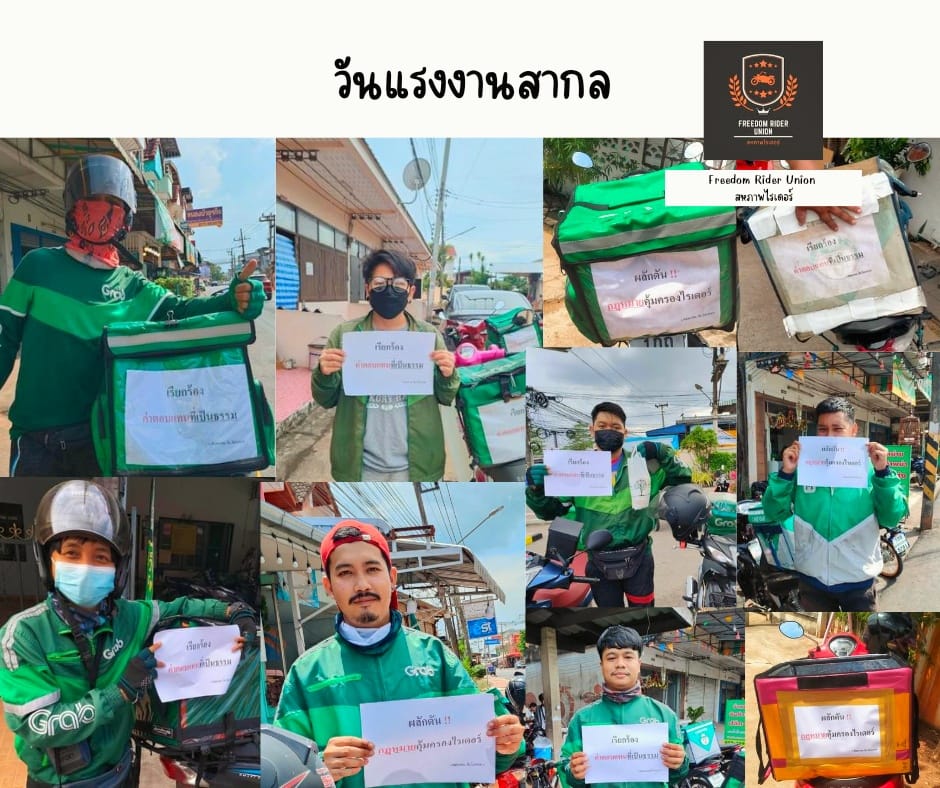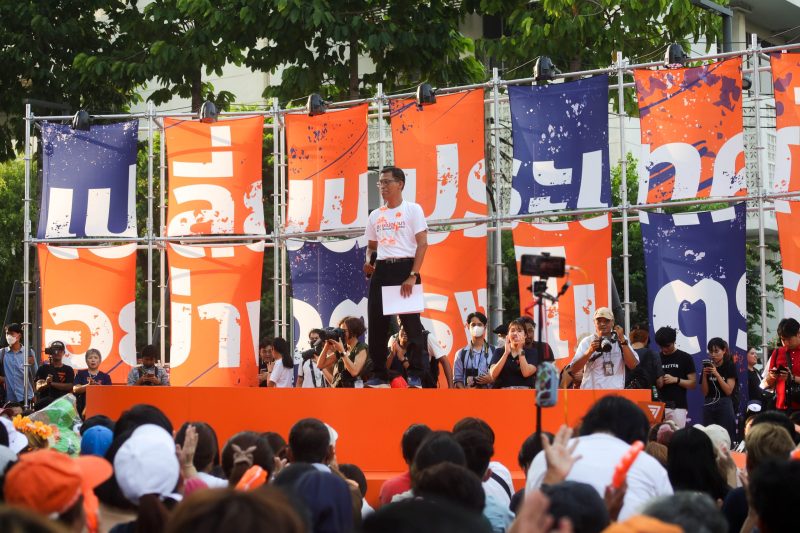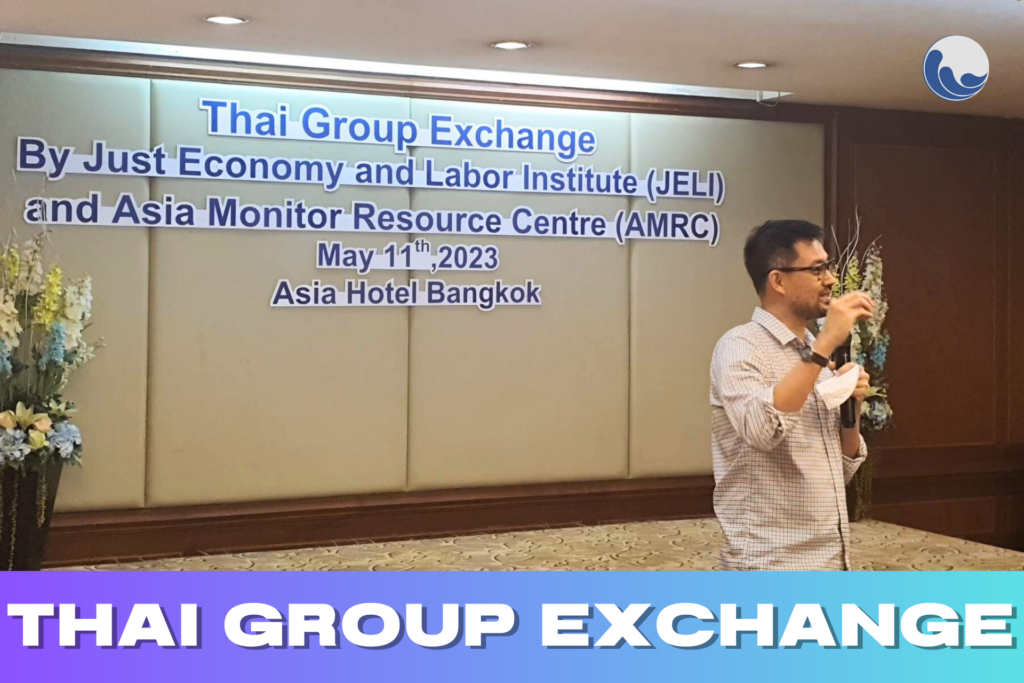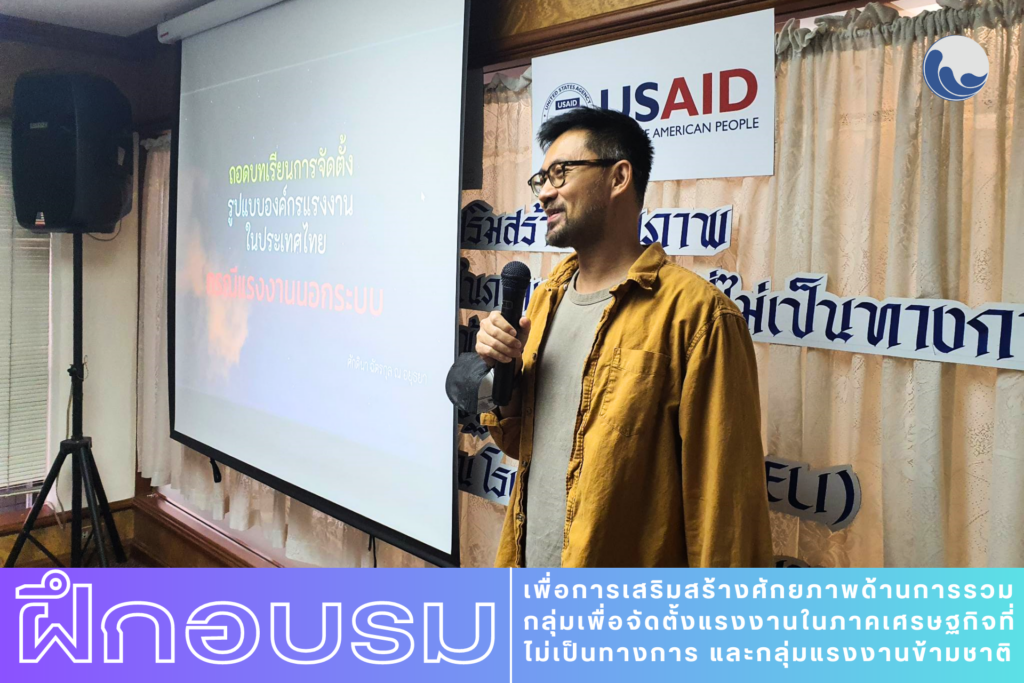May has passed, which is considered a significant month because May 1st of every year is International Workers’ Day. Numerous civil society organizations and labor groups organized marches and panel discussions to celebrate this milestone. For platform-based riders, symbolic demonstrations took place in various locations nationwide to demand labor rights and benefits, including fair round-trip compensation, the right to accident insurance, and more.
In terms of media and publications, Dr. Kriangsak Teerakowitkajorn, managing director of JELI, published an academic article titled “A Labor Strategy Beyond Elections” on the Asian Labour Review website. The article invites exploration into the relationship between the organization of labor collectives – trend and its future – and the recent election in Thailand. It also presents ways to strengthen the organized groups and unity of labor in Thailand.
In terms of meetings and seminars, JELI co-hosted a meeting titled “Thai Group Exchange” with the Asia Monitor Resource Centre (AMRC). This event featured representatives from international labor organizations, Thai civil society organizations, and labor representatives from various business sectors. The participants were invited to engage in discussions, seeking ways to collaborate to promote and strengthen the collective bargaining rights of workers.
In addition, JELI hosted a meeting titled “Workshop to Enhance Capacity for Group Formation and Organization among Workers in Informal Sector and Migrant Workers” . The purpose of this event was to create a space where workers could exchange ideas and learn about the knowledge relevant to the organization and formation of workers’ collectives in each sector, with an aim to strengthen their negotiation power for rights and welfare. Participants included representatives of platform workers, particularly rider groups, and representatives of migrant workers in the agricultural sector from the northern region of Thailand.
Finally, representatives of JELI participated in and presented information on the labor rights situation in Thailand at the “Countering Shrinking Space and Grassroot Resistance in South-East Asia: Regional Exchange” meeting. The participants were labor organization representatives from various countries in Asia, including the Philippines, Cambodia, Laos, and Myanmar. They presented information on the labor rights situation and the challenges faced in their respective countries.
Important News
Riders Across Several Provinces Rally and Demonstrate to Demand Rights and Welfare on International Labor Day

May 1, 2023 – Riders in several provinces across the country united to hold symbolic demonstrations in honor of International Labor Day. Labor Day activities included marches and rallies, though in Surat Thani, while no march was organized, riders gathered symbolically to express their concerns and push for laws protecting workers’ rights. They have announced a week-long campaign of attaching notes to the food boxes attaching on their bikes, with the message ‘Demanding Fair Compensation’
Source: สหภาพไรเดอร์ – Freedom Rider Union
Medias and Publications
A Labor Strategy Beyond Elections – Dr. Kriangsak Teerakowitkajorn

Dr. Kriangsak Teerakowitkajorn, JELI’s managing director, in collaboration with the Asian Labour Review (https://labourreview.org/), has authored and published the online article “A Labor Strategy Beyond Elections”, navigating the recent national election which raises important questions about the future of organized labor in Thailand, faced with challenges due to the decline of trade unionism, increased reliance on migrant workers, and the government’s suppression of labor rights.
The article discusses the efforts of the Thai Social Democratic Party (TSDP) and the Nation Building Labor Party (NBLP), which advocate for labor rights but struggle to gain electoral traction, and Move Forward Party, which has a more substantial chance of forming a government and incorporates labor activists in its party list.
It concludes that the Thai labor movement needs to develop effective strategies beyond election cycles, focusing on organizing and unionizing, and build reciprocal relationships with political parties.
Read More at https://labourreview.org/beyond-elections/
Conferences, Trainings, and Seminars
Thai Group Exchange

May 11, 2023 – JELI, in collaboration with the Asia Monitor Resource Centre (AMRC), hosted a private seminar with knowledge exchange platform on labor rights, entitled ‘Thai Group Exchange’. The event took place from 9:00 to 17:00 at the Prakai Petch conference room at the Asia Hotel. Participants included representatives from various international labor organizations, Thai civil society organizations, and workers from different business sectors. They were encouraged to engage in discussions aimed at finding ways to collaborate, bolstering collective action, and strengthening labor advocacy schemes of each party.
For Thailand, a representative from the Workers’ Union provided an overview on the employment status in the country – from the onset of the Covid outbreak until now. Generally, employment and economic activity have started to recover compared to during the outbreak when a large number of people were pushed out of the social security system.
In the case of migrant workers, they have begun to return to work in Thailand after returning to their home countries during the outbreak. However, migrant workers, who are predominantly informal workers, have long been known to be facing chronic problems that affect their quality of life – from inflation and soaring living costs. They also have to endure unfair working and employment conditions, which became increasingly intense during the pandemic. This is consistent with the information provided by a representative from the MAP Foundation, stating that during the outbreak, migrant workers in factories encountered problems such as wage cuts, reduced working hours, and, worst of all, being laid off without any safety net to support contrary to their Thai counterparts who have been protected under labor and social protection laws. Moreover, they are unable to form groups to negotiate due to unfavorable Thai laws.
Before the end of today’s event, all participants were divided into two groups to discuss and learn about each others’ strategies to be used in running campaigns and advocating for labor rights. The conclusion drawn was that workers from all industrial sectors need to find ways to unite in order to build strength, set clear targets for campaigning, and hold regular meetings to foster work connections.
Workshop to Enhance Capacity for Group Formation and Organization among Workers in Informal Sector and Migrant Workers

On May 12, 2023, JELI hosted a ‘Workshop to Enhance Capacity for Group Formation and Organization among Workers in Informal Sector and Migrant Workers’ at the Asia Hotel, Bangkok, in the Pikulkaew Meeting Room, from 9:00 to 16:30. The purpose of this event was to create a space where workers could exchange ideas and learn about the knowledge relevant to the organization and formation of workers’ collectives in each sector, with an aim to strengthen their negotiation power for rights and welfare. Participants included representatives of platform workers, particularly rider groups, and representatives of migrant workers in the agricultural sector from the northern region of Thailand.
During the morning session, space was provided for each labor group to explain their strategies in organizing and forming their groups. A discussion was held to identify points that could be improved to make the group formation more effective and stronger. The session allowed participants to explore ways that each group used to build consensus among members in determining the ultimate demands to push forward in their fight.
In the afternoon, labor issues expert Professor Sakdina Chatkul-Na-Ayutthaya gave a lecture on labor group formation. He highlighted that the problem of group formation in Thailand is intricately linked with the requirement of registration as an association, organization, or foundation only, which results in limited participation from workers. The real crux of this issue, however, is the necessity to gather a large number of members, so that the group could have leverage in bargaining power.
After that, Professor Sakdina Chatkul-Na-Ayutthaya provided knowledge about the four sources of power: 1. Structural power – power associated with a societal position, 2. Collective power – power from the unity of workers, 3. Institutional power – power obtained from organizing into an entity, and 4. Social power – the source of power that comes from the support of people in society.
Professor Sakdina concluded that, to achieve the ultimate goal of organizing, it is essential not to view each group of workers separately but to see everyone as a part of the same class. Organizing for labor solidarity does not necessarily require the absolute involvement of seniors nor official recognition by the state, but it requires participation from all workers to avoid leadership bias. The method involves discussions to find an appropriate form of unity. Workers need to collaborate and analyze from which sections/partners they can draw power to build substantial negotiation power. Hence, strategic thinking must be based on the four sources of power as mentioned.
Countering Shrinking Space and grassroot resistance in South-East Asia: Regional Exchange

From May 22nd to 24th, 2023, representatives from JELI participated and presented information on the situation of platform workers rights in Thailand at the regional exchange meeting called “Countering Shrinking Space and Grassroot Resistance in South-East Asia”, organized by the Solidar Foundation in collaboration with three other international labor organizations. The meeting took place at the Ambassador Hotel in Bangkok. Participants included representatives from various labor organizations in many Asian countries such as the Philippines, Cambodia, Laos, Myanmar, etc. They presented information about the labor rights situation and challenges in their respective countries.
On the first day, there was a panel discussion on the topic ‘Feminist strategies to counter shrinking space’, which is about using feminist strategies to address the problem of the shrinking of civil society organizations and grassroots labor groups – a major issue in Asia. The conclusion is that we need to increase the space for expression and voicing opinions for female labor representatives and people of diverse gender groups, enhancing their role in order to change the landscape of labor rights, where males often play a leading role.
On the second day, participants and organizers agreed to issue a declaration reflecting the labor rights situation, the work-related problems encountered by each organization, along with demands for addressing the issues faced. This declaration will be forwarded to other civil society organizations for joint endorsement and will be further presented to the public. The subsequent activity was a panel discussion on the topic ‘Labour and Trade Unions activism in Southeast Asia’, addressing the trend and movements of labor unionization in Southeast Asia. In this activity, the representative from JELI, Dr. Kriangsak Teerakowitkajorn, participated by providing relevant knowledge and presenting information about the situation in Thailand.
The final day began with participants collectively revising the declaration and proposals for further dissemination. Then, the participants joined in a roundtable discussion with representatives from the embassies of Sweden and Belgium, presenting the key points of the declaration to inform them about the issues and ask for their advice on possible solutions. The day ended with a discussion to summarize what has been learned from the three-day activities. This opened up a space for exchanges to find ways for all organizations to work together, with the main goal being to strengthen labor rights advocacy effectively and to go beyond the issues in their own countries.
